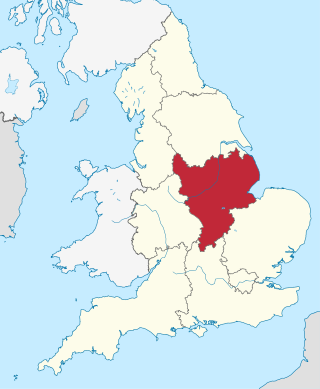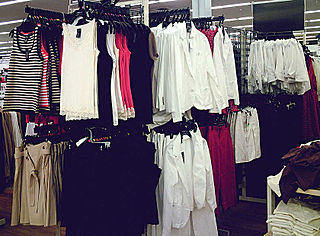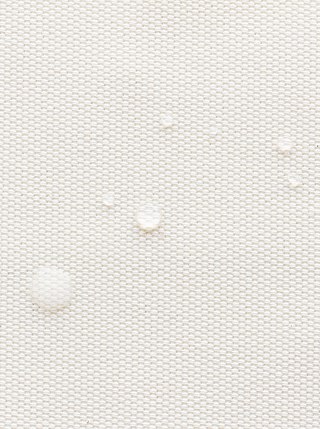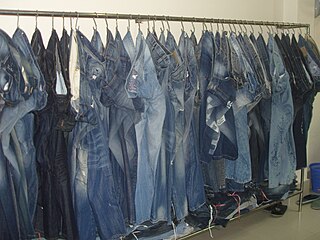
The East Midlands is one of nine official regions of England at the first level of ITL for statistical purposes. It comprises the eastern half of the area traditionally known as the Midlands. It consists of Leicestershire, Derbyshire, Lincolnshire, Northamptonshire, Nottinghamshire and Rutland. The region has an area of 15,627 km2 (6,034 sq mi), with a population over 4.5 million in 2011. The most populous settlements in the region are Derby, Leicester, Lincoln, Mansfield, Northampton and Nottingham. Other notable settlements include Boston, Buxton, Chesterfield, Corby, Coalville, Gainsborough, Glossop, Grantham, Hinckley, Kettering, Loughborough, Louth, Market Harborough, Matlock, Newark-on-Trent, Oakham, Skegness, Wellingborough, Worksop and Towcester
The Mackintosh raincoat is a form of waterproof raincoat, first sold in 1824, made of rubberised fabric.

Ready-to-wear is the term for ready-made garments, sold in finished condition in standardized sizes, as distinct from made-to-measure or bespoke clothing tailored to a particular person's frame. In other words, It is a piece of clothing that was mass produced in different sizes and sold that way instead of it being designed and sewn for one person. The term off-the-peg is sometimes used for items other than clothing, such as handbags.

A raincoat is a waterproof or water-resistant garment worn on the upper body to shield the wearer from rain. The term rain jacket is sometimes used to refer to raincoats with long sleeves that are waist-length. A rain jacket may be combined with a pair of rain pants to make a rainsuit. Rain clothing may also be in one piece, like a boilersuit. Raincoats, like rain ponchos, offer the wearer hands-free protection from the rain and elements; unlike the umbrella.

Next plc (styled as NEXT) is a British multinational clothing, footwear and home products retailer, which has its headquarters in Enderby, England. It has around 700 stores, of which circa 500 are in the United Kingdom, and circa 200 across Europe, Asia and the Middle East. Next is the largest clothing retailer by sales in the United Kingdom, having overtaken Marks & Spencer in early 2012 and 2014. It is listed on the London Stock Exchange and is a constituent of the FTSE 100 Index.

GUS plc was a FTSE 100 retailing, manufacturing and financial conglomerate based in the United Kingdom. GUS was an abbreviation of Great Universal Stores, the company's name before 2001, while it was also known as the Glorious Gussies amongst stockbrokers. The company started out as Universal Stores, a mail order business created by the Rose family. In 1931, Isaac Wolfson joined the mail order company and would, through a series of takeovers, turn it into a retail, manufacturing and financial conglomerate, becoming Europe's biggest mail order firm and with over 2,700 physical stores. His son, Leonard Wolfson, followed him as chairman, to be succeeded by his nephews David Wolfson (1996–2000) and Victor Barnett (2000–2002). During the 1980s, the business divested much of its physical retail and manufacturing subsidiaries under Leonard Wolfson to concentrate on mail order, property and finance. In October 2006, the company was split into two separate companies: Experian which continues to exist, and Home Retail Group which was bought by Sainsbury's in 2016.
George William Davies is an English fashion designer and retailer.

Lewis's was a chain of British department stores that operated from 1856 to 2010. The owners of Lewis's went into administration several times, including in 1991. The first store, which opened in Liverpool city centre, became the flagship of the chain. Several stores in the chain were bought in 1991 by the company Owen Owen and continued to operate under the Lewis's brand name for several years, but after the closure of the Manchester store in 2001, only the original Liverpool store continued to trade under the Lewis's name. This store was sold in 2007 to Vergo Retail Ltd and closed in 2010.

Waterproof fabrics are fabrics that are, inherently, or have been treated to become, resistant to penetration by water and wetting. The term "waterproof" refers to conformance to a governing specification and specific conditions of a laboratory test method. They are usually natural or synthetic fabrics that are laminated or coated with a waterproofing material such as rubber, polyvinyl chloride (PVC), polyurethane (PU), silicone elastomer, fluoropolymers, and wax. Treatment could be either of the fabric during manufacture or of completed products after manufacture, for instance by a waterproofing spray. Examples include the rubberized fabric used in Mackintosh jackets, sauna suits and inflatable boats.

JD Sports Fashion plc, more commonly known as JD Sports, JD or JD Group is a British sports-fashion retail company based in Bury, Greater Manchester, England. It is listed on the London Stock Exchange and is a constituent of the FTSE 100 Index. Pentland Group owns 55% of the company.

Sir John Barran, 1st Baronet was a British clothing manufacturer and Liberal Party politician.

London Fog is an American manufacturer of coats and other apparel. The company was founded in 1922 as the Londontown clothing company by Israel Myers.
Joseph Hepworth (1834–1911) was the clothing manufacturer who founded Joseph Hepworth & Son, a company which grew to become the United Kingdom's largest clothing manufacturer and which is now known as Next plc.
N. Corah and Sons was a manufacturer of hosiery and textiles, located in Leicester in the United Kingdom. At one time it was the largest knitwear producer in Europe, and its products had a major influence on the development and prosperity of the Marks & Spencer chain of retail stores.

Ready-made garments are mass-produced finished textile products of the clothing industry. Ready-made are garments that can be bought off of store racks or online, and are ready to wear. They are not custom tailored according to measurements, but rather generalized according to anthropometric studies to fit a general range. They are made from many different fabrics and yarns. Their characteristics depend on the fibers used in their manufacture. Ready-made garments are divided into the following types: outer clothing, which includes workwear and uniforms, leisure wear, and sportswear ; and undergarments, which include jersey goods and lingerie.

Galvin Green is a golf clothing brand based in Växjö, Sweden. The company was established in 1990 by entrepreneur Tomas Nilsson. Galvin Green designs and sells multi-layer garments for the game of golf, sold via golf retail stores, on-course shops and authorized online retailers.

A cape is a clothing accessory or a sleeveless outer garment which drapes the wearer's back, arms, and chest, and connects at the neck.

Hallensteins Glassons is a New Zealand fashion company based in Auckland, with stores in New Zealand and Australia.

Joules is a British clothing company which sells clothing and homeware products inspired by British country lifestyles. Its founder Tom Joule described its business model in 2011 as creating clothing with "colour and fun and entertainment".

Alligator Rainwear was a British company, whose main factory was based in Stockport. It was best known for its 1960s collaborations with Mary Quant in the design and production of her "Wet Look" collection of PVC raincoats.

















